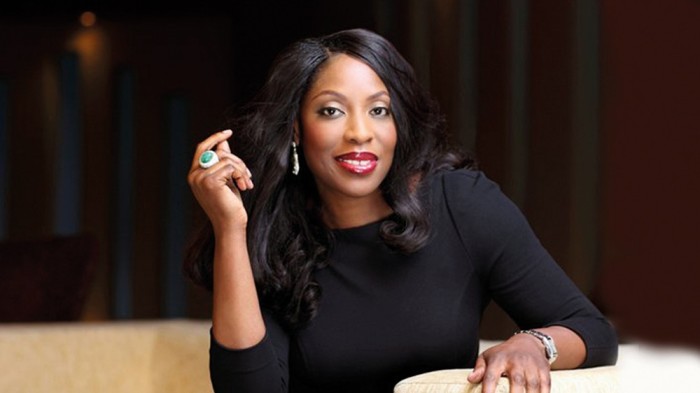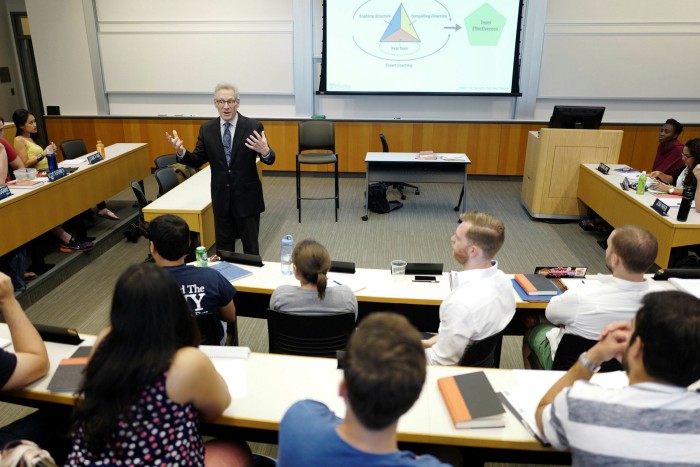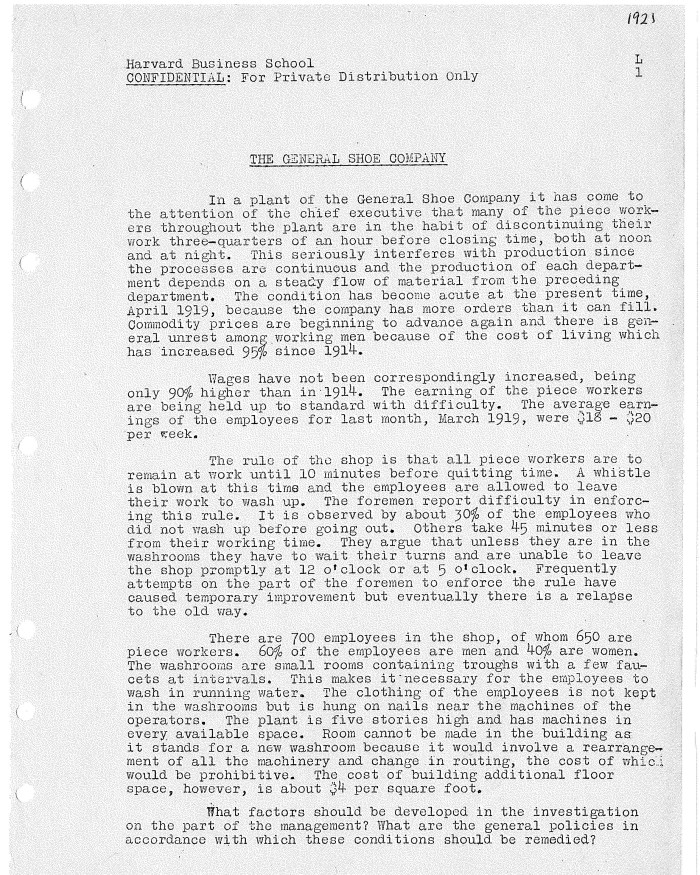A century of MBA case studies: exacting examples from business life
Roula Khalaf, Editor of the FT, selects her favourite stories in this weekly newsletter.
In 1921, Harvard Business School produced its first, single-page mimeographed case study for students (view here and bottom), about the practical dilemmas faced by managers at the General Shoe Company. Intended to prompt class discussions, the case method has since been adopted by schools around the world as a core part of teaching.
Today, Harvard, Ivey Business School in Canada and The Case Centre are leaders among 50 producers and distributors of thousands of cases, of which millions of copies are sold annually. They are written by a growing number of institutions, in formats including video, describing challenges on an ever broader range of issues, geographies and protagonists.
Below is an abstract of one of Harvard’s most recent cases, on the African media company EbonyLife.

One unusually quiet morning in Lagos, Nigeria in December 2020, Mosunmola “Mo” Abudu, founder and chief executive of EbonyLife Media and one of Africa’s biggest names in the business, brought her laptop to work on the rooftop patio of EbonyLife Place, the company’s flagship lifestyle and entertainment resort.
Founded by Abudu in 2012 with a mission to bring high-quality African stories to the world, EbonyLife was the company behind many of Nigeria’s biggest movies and television shows. It began with a linear TV channel on the Africa-wide direct broadcast satellite service DStv. By 2020, it had produced more than 5,000 hours of TV content and Nigeria’s top-three highest grossing movies.
With a desire for greater control over production and following the end of its relationship with DStv, EbonyLife launched EbonyLife ON (EL ON), an on-demand streaming service. However, it struggled to grow the number of EL ON subscribers.
Global MBA Ranking 2022

Find out which schools are in our ranking of MBA degrees. Learn how the table was compiled and read the rest of our coverage at www.ft.com/mba.
Abudu started to think about whether she should continue fighting to grow EL ON. Should EbonyLife focus instead on co-production deals with international media distributors such as Netflix, Sony and AMC? Abudu, who had been in the media business for nearly 20 years, needed to make this significant decision for EbonyLife.
Her interest in the media and entertainment industry emerged from a desire to correct harmful stereotypes about Africa. Born in London to Nigerian parents, she grew up in the UK and Nigeria. Drawn to African stories, she wanted to address the fact that there was so much the world did not know about Africa. “I think somewhere deeply buried in my subconscious was a need to tell Africa’s story,” she says.
Growing up in the UK, she routinely encountered misconceptions about Africa and was surprised by how they persisted when she was an adult. “The same questions I was being asked in England [40 years ago],” she says, “are the same questions my children were being asked when they went to school in England.” Questions like, “Do you guys live in trees?”
In July 2020, following its exit from DStv, EbonyLife publicly announced EL ON, with plans to make the platform its main distribution channel. While EbonyLife had already created extensive programming, “a lot of that content was consumed on a daily basis and had a very minimal shelf life”, Abudu explains.
She began to explore the new opportunity of co-productions with global partners that would eventually be distributed through Nigerian TV channels. She signed a multi-title co-production deal with Netflix to make several movies and TV series. Partnering with such companies reduced the upfront financial risks of production. But it was difficult to assess the size of the global audience “Nollywood” (Nigeria’s Hollywood) films gained because of the reluctance of the international platforms to share viewership data. Also, Nollywood producers could not interact directly with these viewers. As a result, it was difficult for them to learn who had viewed the content and what aspects of the stories the audience had enjoyed, and then use this insight to plan their future productions.
Beyond producing content, EbonyLife sought to build its own media and entertainment ecosystem. It helped grow the pipeline of local talent through a creative academy that enabled students to attend classes free of charge, funded by the Lagos state government. Abudu also believed EbonyLife could grow further by investing more in its audience’s experiences. In December 2019 in Lagos, she opened the multi-purpose resort EbonyLife Place, which included two restaurants, a boutique hotel, five movie theatres, meeting rooms and a larger multipurpose function hall.
A year later, Abudu was at EbonyLife Place to plan for its relaunch after the lifting of pandemic restrictions. However, she faced other pressing concerns. She reflected on her options around how EbonyLife would distribute its content. Was it too early to make judgments about EL ON? What changes should EbonyLife make to EL ON? Equally, she considered the alternative: could she realistically build a sustainable media business just on international partnerships with streaming services? Was there a scenario in which she could keep EL ON operational while pursuing these international partnerships? After two decades in the industry, pivots were no longer quick or painless. Abudu wondered which option she should pursue.
The above is an adapted abstract of Harvard Business School’s teaching case study EbonyLife Media, written by Andy Wu, Feng Zhu, Wale Lawal and Pippa Tubman Armerding

Comments